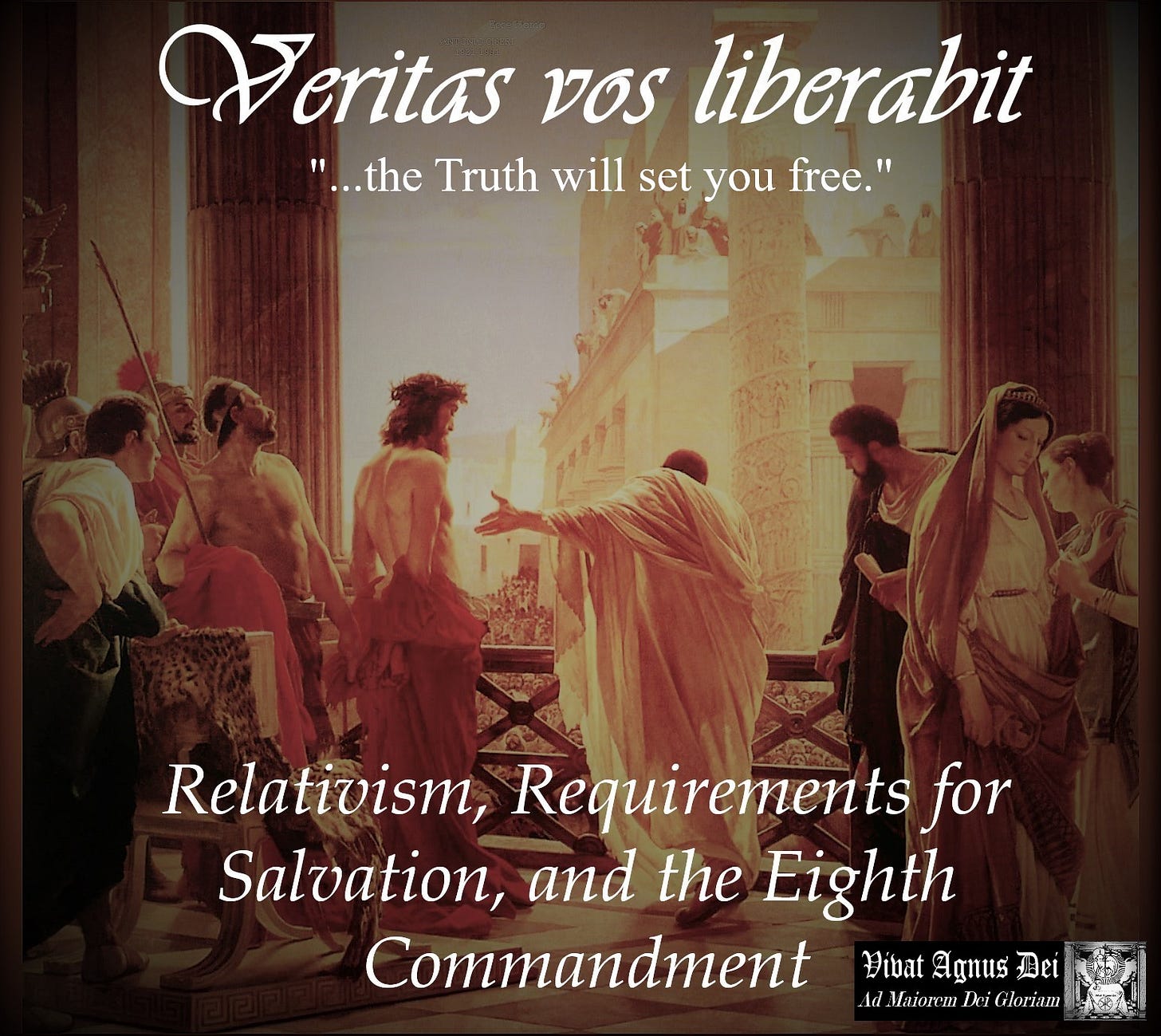Veritas vos liberabit: Relativism & the Eight Commandment
Why is relativism bad long or short term? Why cannot any Christian subscribe even a little bit to this common day apathetic philosophy: Find out at least partly
Post for the Week
New Post: Veritas vos liberabit: Relativism & the Eight Commandment - Why is relativism bad long or short term? Why cannot any Christian subscribe even a little bit to this common day apathetic philosophy: Find out at least partly:
Featured Faith Fragment
The Church teaches that the Blessed Sacrament embodies the full presence of Christ, allowing us to participate in the Paschal Mystery through the Mass, a truth supported by both Scripture and tradition. This reality is prefigured in the Old Testament and evident in the Gospels and New Testament writings, particularly emphasized through Christ's assertion of being the "bread from Heaven" and St. Paul's instructions regarding participation (John 6:35, 51; 1 Corinthians 11:27-32).[1] Over centuries of Christian tradition, the reality of Christ's presence in the Eucharist has been consistently affirmed, providing historical continuity that reinforces this central tenet of the Catholic faith (Acts 2:42-47; Acts 20:7-11; 1 Corinthians 11:23-26).[2] Early sources, such as Justin Martyr in approx. A.D. 155, attest to the Church's longstanding recognition of the Eucharist as the pinnacle of the Christian life.[3] Through applying philosophical principles, the understanding of the Eucharistic doctrine is illuminated, providing rational insight into the mystery of Christ's presence in the sacrament.[4] While initially grounded in Neo-Platonism, the Church adapted to evolving philosophies and coined the term "transubstantiation," clarifying that although the accidental aspects of bread persist, its substance is trans-formed into the full reality of Christ through Aristotelian metaphysics.[5] The Church and Scripture are emphatic on the point that Christ is truly present in the Eucharist in His Body, Blood, Soul, and Divinity; and the Church has never wavered on that conviction.
[1] Catechism of the Catholic Church, 2nd ed. (Washington, DC: United States Catholic Conference, 2000), 1333-1336.
[2] CCC, 1329.
[3] CCC, 1345-1347
[4] CCC, 1373-1381
[5] CCC, 1376.; Philip Schaff. “The Apostolic Fathers with Justin Martyr and Irenaeus.”, Ante-Nicaean Fathers, Vol. 1, Christian Classics Ethereal Library, 1885, pg. 495. (Justin Martyr. First Apology, Chapter LXVI.); Gregory of Nyssa. The Great Catechism, trans. William Moore and Henry Austin Wilson. From Nicene and Post-Nicene Fathers, Second Series, Vol. 5. Edited by Philip Schaff and Henry Wace. (Buffalo, NY: Christian Literature Publishing Co., 1893.), Ch. 37. Revised and edited for New Advent by Kevin Knight.; Paul Halsall. “Twelfth Ecumenical Council: Lateran IV 1215.” Internet Medieval Source Book. Fordham University, February 1996, Canon 1.; See Thomas Aquinas, Summa theologiae, III, Q. 75-78, at New Advent, www.newadvent.org.; United States Conference of Catholic Bishops, Compendium on the Eucharist (Washington, D.C.: United States Conference of Catholic Bishops, 2016), 5. Cf. Jeremiah Donovan, trans. The Catechism of the Council of Trent: Pub. by Command of Pope Pius the Fifth. First American ed. (Baltimore: F. Lucas, jr.) 1829, pg. 161.
Website Updates from this Week (3/17/2024-3/23/2024)
Additional thoughts added for Emphasis with a little more Scripture: https://www.vivatagnusdei.com/faith/assertions/bible/ess/ess-session-15





